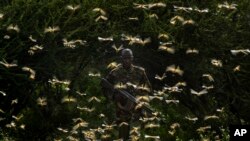After devastating crops in Uganda and Kenya, desert locusts have invaded South Sudan. The government says it’s trying to raise more than $19 million to battle the infestation.
South Sudan Food and Agriculture Minister Onyoti Adigo said a mature swarm of locusts entered South Sudan on Monday.“
Yesterday we received a report that the desert locust had entered South Sudan from Magwi County and we thought it was a normal grasshopper as it was reported early. But our team and those of FAO (U.N. Food and Agriculture Organization) sent people there and they confirmed the presence of locusts in Magwi County’s Lobonok, Owinykibul and Panyikwar,” Adigo told reporters in Juba Tuesday.
The locusts crossed into the southeast area of Magwi County from northern Uganda’s Lamwo district.
The locust infestation spreading across a swath of Eastern Africa is considered the worst in decades, and the pests have caused huge crop losses in several countries, heightening worries about food insecurity for millions of people.
Meshack Malo, the country representative for the FAO, said his agency is working with South Sudan’s agriculture ministry to prevent the locusts from spreading nationwide.“
The population of about 2,000 that has arrived are mature," and the sandy nature of the land in Magwi County is "a good environment for them to lay eggs," Malo told VOA's South Sudan in Focus. He said the FAO and agriculture ministry are discussing the best counter-measures. One option is to freeze the locusts where they lay eggs.
James Janka, South Sudan’s minister for livestock and fisheries, said the locusts will adversely affect many South Sudanese communities, especially in terms of crop production.“
We are also afraid [for] the livestock," he said, because the locusts could consume grass and deprive cattle of grazing areas.
Janka said desert locusts are not a nationwide issue at the moment but a regional one, which requires collective action to prevent the swarms from spreading any further.






